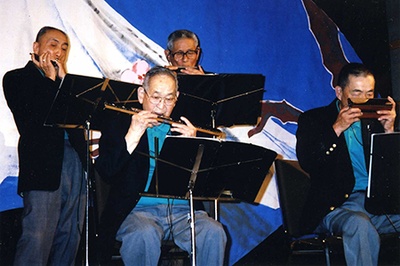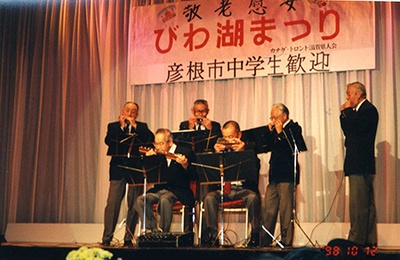“Hail to new Canadians. Pledge loyalty with the land that gave us birth and our destiny yonder gleam the challenge bright, though the way be dark. All together with one voice onto victory…” words by Dr. Irene Uchida, first principal of Lemon Creek School, Officer of the Order of Canada (1993)
Rare are the stories that have continued in our community for the past sixty years. But the Lemon Creek Harmonica band, certainly one of Canada’s oldest, are now into their 65th year as a musical group and, if you are lucky, you can still catch them at the odd event in the Toronto or Hamilton area.
All surviving members are now in their eighties. When I look at that famous 1943 photo of the young Nisei sitting at their playing stations a la Glenn Miller’s big band with the sauve Roy Kumano standing to side, baton in hand, flashing a big toothy smile, looking very much the part of the leader, belying the fact that this was taken in an internment camp for enemy aliens during world war two, I am awed by the passage of so much time.
The story of this band is a truly remarkable one. We all know how the young fellows got to be teenaged prisoners in interior British Columbia. Racism, hysteria and opportunism were mostly to blame. The boys certainly had nothing to say about this. From their coastal homes in beautiful British Columbia, they were sent into the interior prison camps by train, into the Slocan Valley to Lemon Creek, which today is nothing but an empty field, not even a plaque to indicate what happened to our community there 60 years ago.
The best stories often begin serendipitously as this one does. With the entire B.C. Nikkei population exiled from the coast, the government allowed “The New Canadian” newspaper in censored-form to continue to operate from Kaslo, B.C. (1942), as a way to disseminate its propaganda. As most Issei were not able to read English, Junji Ikeno’s father, Kunisuke, a linotype printer but not connected with the paper, was sent to the coast to locate the Japanese linotype faces in a Vancouver warehouse.

Four members of the Lemon Creek Harmonica Band performed at the Hamilton Canadian Japanese Cultural Centre in April 2008. From right are, George Tsushima, Ako Matsubayashi, Noji Murase, and Junji Ikeno. Photo: Takeshi Yano
Back in Lemon Creek, the teenage boys were restless. The school wasn’t built yet, some kids continued to secretly learn Japanese and how to write kanji characters from mothers who suspected that their welcome in Canada was over, some older Issei were experimenting with ways to make sake and the mothers were just trying to hold families together the best they could in this strange new Japantown of tar paper shacks, while husbands and sons toiled in like chain gang in road camps.
Back in the warehouse where the property of 22,000 innocent Japanese Canadians was being kept by the Custodian of Enemy Alien property with the promise of safe keeping, Mr. Ikeno had located the box of linotype faces that he needed. What surprised him was that in the same box, were harmonicas, lots of them, then he got the funny idea that his teenage son, Junji, might like to play with them to while away his time in an internment camps, which was no place for a restless teenager.
Once returning to the camp, it didn’t take Junji long to get the fellows together. The younger nisei were having their fun playing in the fields and trees that some of them never had at home, but the older nisei, the ones who had almost finished high school, having studied hard for a chance to go to the University of British Columbia like the older guys like Tom Shoyama and S.I. Hayakawa who showed the hakujin that we were just as good as they were. The older guys were starting to go stark raving mad because of the boredom and with all the time they never had on the coast to think about whether they belong here in Canada or not.
The band was formed by Junji with 16 teenagers in November 1942. Under the guidance of Junji with some assistance from Roy Kumano who was director, conductor and arranger of the well-known Vancouver Gakkyukai Harmonica Band, the band practiced at the United Church located in the camp and gave their first performance at the opening of Lemon Creek School on March 26, 1943. Their second and final concert was on May Day 1944 when Junji moved to Kaslo to work on the New Canadian. By this time, Japanese Americans were beginning to return to their west coast homes and businesses that were never were confiscated and sold by their government as ours’ were.
They reunited 36 years later at the first post war Lemon Creek reunion in Toronto in 1980. Ikeno and five other band members: Hitoshi “Babe” Ikeno, Ako Matsubayashi, Noji Murase, George Tsushima and Frank Usami, played such favorites as their theme song, the first song they learned to play as a band, “Uramachi Jinsei” and “You Are My Sunshine”. Since that occasion, the band has been actively playing at Japanese Canadian cultural events, including the Powell Street Festival in Vancouver (2003), at the Japanese Canadian Cultural Center in Toronto, Hamilton and at numerous events in the Greater Toronto Area.
The group got together for another concert at the Toronto JCCC on Friday, August 8. The performing members were: Ikeno (Mississauga), 85, Ako Matsubayashi (Burlington), 81, Noji Murase (Hamilton), 84 and George Tsushima (Toronto), 83.
Other band members in that well known photograph entitled “School Opening Concert Mar. 26 – Apr. 1, 1943” are Mits Endo, Kunio Suyama, Frank Usami, Tosh Goto, “Tarzan” Endo, Henry Wakabayashi, Hideo Matsumoto, George Inouye, Terry Kawakami, Bob Uno, “Fudge” Fujino, Mits Yoshikuni and “Babe” Hitoshi Ikeno. Ken Sugamori, a pre-war member of Kumano’s Gakkyukai band, was recruited in the 1980s.
After the war, Ikeno recalls coming to Toronto and settling at the United Church Co-Op on Jarvis, north of Wellesley, in a big old house that was set up specifically for exiled Nisei who needed a cheap place to stay while they got settled in Toronto. There was a B.C. Security Commission office on Spadina Avenue headed by a Mr. Trueman, who was directing Nikkei families to cities where they could or couldn’t live.
Ikeno’s first job was with T.H. Best printers on Queen Street (at Beverly) where he was treated very well and making the “good” salary of $30 a week. Following this he had several jobs as a linotype operator in the GTA including at the Toronto Telegram newspaper. He has resided in Mississauga for the past 45 years, where he lives with his wife, “Tosh” (nee Maeda), 85, daughter, Patricia, son-in law, Steve, Dylan and Nico. Two other children are son Don, wife, Su, kids, Rye and Michael; and daughter, Tina, husband, Richard, kids, Cressa and Mya.
Tsushima learned how to play harmonica from his mother, Iku, a former school teacher in Hirosaki. His dad, Chuzo from Goshogawara, Aomori-ken, had a confectionary store at the corner of Main and Keefer Streets in Vancouver. “We were Depression era kids and didn’t have the money to play anything more expensive than harmonicas,” recalls the retired automobile mechanic. He and wife Ayako (nee Naruse) are proud grandparents of four.
Murase was allowed to graduate from Fairview Commerce High school in Vancouver before being interned with his family at Lemon Creek. His father Kiku (Gifu-ken), an itinerant salesman who had sold sewing patterns and worked for Komura Cleaners on Powell Street had passed away in 1936, so his mother, Nisei Toki (Yokosuka) had the formidable task of raising Yutaka, Abie, Ray, “Ike”, Yoji and Mutsuo single handedly. Her father had immigrated at the turn of the century and worked at a sawmill in Dollarton, B.C.
Murase was recruited as an assistant editor of the New Canadian newspaper (taking over from Frank Moritsugu) in 1944 then based in Kaslo, after a referral from Irene Uchida, then principal of the LC school, he was hired by Tom Shoyama. He moved with the paper to Winnipeg in 1945. He moved to Hamilton in 1946 to join his mom and where he worked for a transportation company for 20 years, then as a manager of a Liquor Control Board of Ontario (LCBO) store. He retired in 1990 and now enjoys golf and volunteers at the Hamilton Japanese Canadian center. Wife Toshiko passed away in 2001. He has a son, Michael (Blind River, ON) and daughter, Gracia.
“Frank Usami was the lead player and he played all of the Japanese songs with a special skill,” remembers Noji, pointing out that Frank also read music and sang karaoke extremely well.
Matsubayashi was born in Vancouver on Oct. 16, 1927. He and wife Toki have two sons, Bruce Mikio and James Akio.
After the war Matsubayashi had a business in 12 Mile Creek, B.C. where he bought logs, saw milled them into lumber then sold them to the planer mills. After five years, he sold the business and relocated to Toronto in 1954 where he worked for Alexander Murray Building Materials as an inventory clerk and moved to Steinbergs as a Traffic Supervisor. After 5 years he moved to Montreal in 1964 to work for T. Eaton Company, Eastern Division, as an Activity Manager for 13 years. Then he worked for Lumsden Brothers Ltd. eventually became vice-president and retired after 15 years in 1994.
His father, Heijiro (mother Kanayo), was the last mayor of Slocan City, at the time the smallest incorporated city in North America, in the late sixties and early seventies.
As a retiree I spend a lot of my time doing volunteer work for the City of Burlington by helping to coordinate activities with the twin city, Itabashi-ku in Tokyo, Ako says. Next year will mark the twentieth anniversary of that relationship.
Matsubayashi is assisting with those preparations and will be going to Japan in October 2009 as an official representative of the City of Burlington. He is a recipient of the city’s Patron Award (2006) for his continuing volunteer efforts, which includes the planting of 53 sakura trees in Spencer Brant Park and the naming of Itabashi Way.
“I don't think any of us has given any thought of this being a 65th anniversary,” says the ever modest Ako whose parents hail from Shiga-ken. “All we know is that we are all in our eighties and hope to carry on as long as we can.”
* * *
If you are interested in ordering a copy of the band’s CD ($15, plus postage), contact George Tsushima in Toronto at (416) 444-8591. Norm always welcomes your feedback at masaji777@gmail.com
* This article was originally published in Nikkei Voice (Toronto).
© 2008 Norm Masaji Ibuki






